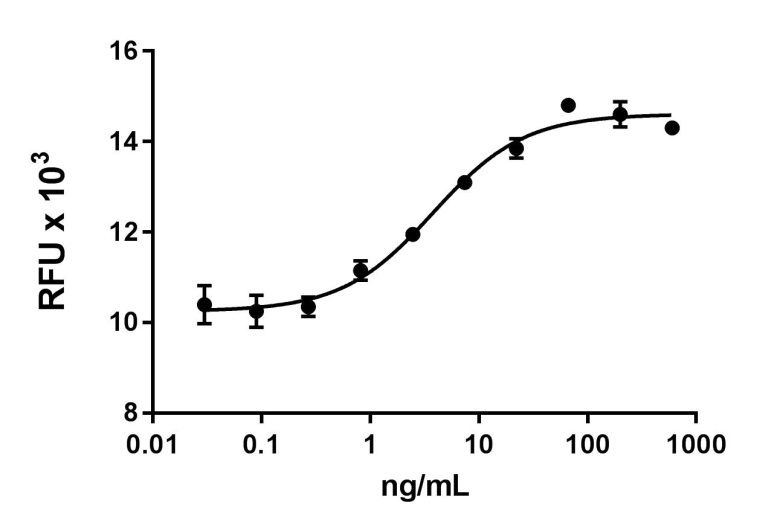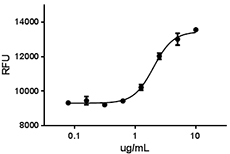- Regulatory Status
- RUO
- Other Names
- Neurotrophin-3 (NT-3), Neuron growth factor 2 (NGF2), HGNF
- Ave. Rating
- Submit a Review
- Product Citations
- publications
| Cat # | Size | Price | Quantity Check Availability | Save | ||
|---|---|---|---|---|---|---|
| 598202 | 10 µg | 175€ | ||||
Neurotrophins are growth factors that modulate growth, differentiation, and survival of neurons. Structure related proteins include neuron growth factor (NGF), brain derived neurogenic factor (BDNF), neurotrophin-3 (NT-3), and neurotrophin-4/5. They are highly homologous and share a similar structure of a tertiary folded, cysteine rich "knot". Neurotrophins are critical to the development of the central and peripheral nervous system and they play important roles in injury induced neuron regeneration. NT-3 is encoded by the the NTF3 gene and shares high similarity among species including human, pig, rat, and mouse. It is the only neurotrophin that affects the development of the enteric nervous system. NT-3 can act on neuroblast/progenitor cells directly or synergistically with other neurotrophins. It can regulate growth and maturation of neurons in both peripheral and central nervous systems. NT-3 elicits its activity mainly through activation of p75, tropomyosin-related kinase receptors (Trk), TrkB, and TrkC. NT-3 is the only ligand for TrkC and studies indicate that neuron generation in myenteric and submucosal plexuses is blocked in mice with deficiency in NT-3/TrkC signaling. The expression of NT-3 is regulated by bone morphogenetic protein 2 (BMP-2) and bone morphogenetic protein 4 (BMP-4). Although the NT-3-TrkC signal transduction is known to lead cellular apoptosis in the absence of ligand, overexpression of NT-3 conversely disrupts the tumor-preventive control and results in tumor generation. Dysregulation of NT-3 is known to be related with neuroblastoma, Alzhiemer's, Huntington's, and Parkinson's Disease. Due to the broad cell poplulations affected by NT-3, the control of NT-3-TrkC pathway has become a target for therapeutical approach for neurogenic diseases.
Product DetailsProduct Details
- Source
- Human NT-3, amino acids Tyr139-Thr257 (Accession# NM_002527.4) with an N-terminal Met, was expressed in E. coli.
- Molecular Mass
- NT-3 recombinant protein is a noncovalent linked homodimer. The 120 amino acid recombinant protein has a predicted molecular mass of approximately 13.6 kD as monomer, 26.5 kD as dimer. The predicted N-terminal amino acid is Met.
- Purity
- >98%, as determined by SDS-PAGE and HPLC analysis.
- Formulation
- Lyophilized
- Endotoxin Level
- Less than 0.1 ng per µg of protein.
- Storage & Handling
- Unopened vial can be stored at -20°C or -70°C. For maximum results, quick spin vial prior to opening. Reconstitute in water to a concentration of 0.1-1.0 mg/ml. Do not vortex. It is recommended to further dilute in a buffer containing a carrier protein such as 0.1% BSA and store working aliquots at -20°C to -80°C. Avoid repeated freeze/thaw cycles.
- Activity
- The ED50 as determined by the dose-dependent induction of choline acetyl transferase activity in rat basal forebrain primary septal cell cultures was found in the range of 20-50 ng/ml, corresponding to a specific activity of 2-5 x 104 units/mg.
- Application
-
Bioassay
- Application Notes
-
This product is reactive with human, cow, dog, frog, hamster, mouse, pig, rat, monkey.
- Product Citations
-
Antigen Details
- Structure
- Dimeric growth factor.
- Distribution
-
NT-3 is expressed mainly in neurons and neurogenic stem/progenitor cells of the central and peripheral nervous systems.
- Function
- NT-3 is essential for development of intrinsic nervous system and maintain neuron cell growth and maturation.
- Interaction
- Neuroblasts, sensory neurons, sympathetic neurons.
- Ligand/Receptor
- TrkA, TrkB, TrkC.
- Cell Type
- Neural Stem Cells
- Biology Area
- Cell Biology, Neuroscience, Stem Cells, Synaptic Biology
- Molecular Family
- Cytokines/Chemokines, Growth Factors
- Antigen References
-
1. Chalazonitis A. et al. 1996. Mol. Neurobiol. 12:39.
2. Kim Y.H. et al. 2012. J. Neurooncol. 106:89.
3. Crigler L. et al. 2006. Exp. Neurol. 198:54.
4. Chalazonitis A. et al. 2004. Prog. Brain Res. 146:243. - Gene ID
- 4908 View all products for this Gene ID
- UniProt
- View information about NT-3 on UniProt.org
Related FAQs
- Why choose BioLegend recombinant proteins?
-
• Each lot of product is quality-tested for bioactivity as indicated on the data sheet.
• Greater than 95% Purity or higher, tested on every lot of product.
• 100% Satisfaction Guarantee for quality performance, stability, and consistency.
• Ready-to-use liquid format saves time and reduces challenges associated with reconstitution.
• Bulk and customization available. Contact us.
• Learn more about our Recombinant Proteins. - How does the activity of your recombinant proteins compare to competitors?
-
We quality control each and every lot of recombinant protein. Not only do we check its bioactivity, but we also compare it against other commercially available recombinant proteins. We make sure each recombinant protein’s activity is at least as good as or better than the competition’s. In order to provide you with the best possible product, we ensure that our testing process is rigorous and thorough. If you’re curious and eager to make the switch to BioLegend recombinants, contact your sales representative today!
- What is the specific activity or ED50 of my recombinant protein?
-
The specific activity range of the protein is indicated on the product datasheets. Because the exact activity values on a per unit basis can largely fluctuate depending on a number of factors, including the nature of the assay, cell density, age of cells/passage number, culture media used, and end user technique, the specific activity is best defined as a range and we guarantee the specific activity of all our lots will be within the range indicated on the datasheet. Please note this only applies to recombinants labeled for use in bioassays. ELISA standard recombinant proteins are not recommended for bioassay usage as they are not tested for these applications.
- Have your recombinants been tested for stability?
-
Our testing shows that the recombinant proteins are able to withstand room temperature for a week without losing activity. In addition the recombinant proteins were also found to withstand four cycles of freeze and thaw without losing activity.
- Does specific activity of a recombinant protein vary between lots?
-
Specific activity will vary for each lot and for the type of experiment that is done to validate it, but all passed lots will have activity within the established ED50 range for the product and we guarantee that our products will have lot-to-lot consistency. Please conduct an experiment-specific validation to find the optimal ED50 for your system.
- How do you convert activity as an ED50 in ng/ml to a specific activity in Units/mg?
-
Use formula Specific activity (Units/mg) = 10^6/ ED50 (ng/mL)
 Login / Register
Login / Register 













Follow Us